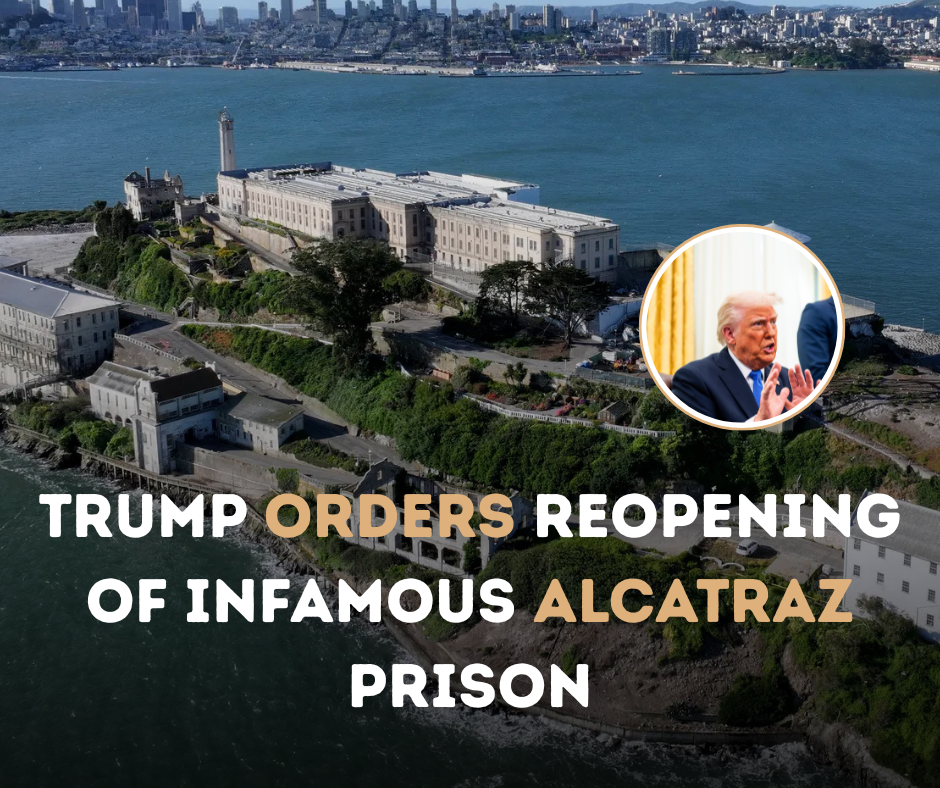In a move that has taken many by surprise, former President Donald Trump has issued a directive to reopen Alcatraz Prison, one of the most notorious correctional facilities in U.S. history. The announcement, made on May 9, 2025, has sparked a flurry of reactions from political figures, law enforcement, and the public alike. For those familiar with the prison’s history, its reopening raises profound questions about the future of the U.S. penal system.
A Historic Symbol of U.S. Incarceration
Alcatraz, located on an isolated island in San Francisco Bay, was one of the most infamous federal prisons in America. It housed notorious criminals like Al Capone and Robert Stroud, the “Birdman of Alcatraz,” and was known for its harsh conditions and high security. The prison operated from 1934 to 1963, after which it was closed due to high operational costs and the growing realization that its isolated location made it less efficient compared to modern penitentiaries.
Since its closure, Alcatraz Island has become a popular tourist attraction, with visitors from around the world coming to learn about its dark history. Now, in a stunning turn of events, the island’s prison is set to return to its former function as a high-security facility, albeit with modernized systems and facilities.
Trump’s Executive Order: What Does It Mean?
Trump’s decision to reopen Alcatraz is rooted in his broader stance on crime and law enforcement, which he emphasized during his time in office and continued to champion in his post-presidency career. In a statement released alongside the executive order, Trump emphasized the need for more stringent measures to combat rising crime rates across the country. He framed the reopening of Alcatraz as part of a larger strategy to “secure the safety of American citizens” by providing a new, state-of-the-art facility to house the nation’s most dangerous criminals.
“Alcatraz will once again be a place where only the most dangerous and violent criminals will be housed, ensuring they can no longer pose a threat to society,” Trump said.
While Trump did not elaborate on the specifics of how the prison will be modernized, reports indicate that the reopened facility will likely include updated security systems, including advanced surveillance, electronic monitoring, and tighter controls to ensure the safety of both inmates and staff.
A Divisive Decision: Reactions from All Sides
The announcement has been met with mixed reactions. Supporters of Trump’s decision argue that reopening Alcatraz is a bold step in addressing issues related to overcrowded prisons and the growing number of repeat offenders in the U.S. penal system. They believe that a high-security facility like Alcatraz could be used to house violent criminals, gang leaders, and individuals involved in organized crime, effectively taking them off the streets.
On the other hand, critics have raised concerns about the practicality and ethics of reopening such a notorious institution. Some argue that Alcatraz, due to its location and history, represents a dark chapter in American criminal justice that is better left in the past. Legal experts have also questioned whether the high cost of refurbishing the prison and maintaining it would be justifiable given the current state of the U.S. prison system.
“There are so many more effective and humane ways to address criminal justice reform without resurrecting a symbol of the past that was associated with severe punishment and little regard for rehabilitation,” said a spokesperson for the American Civil Liberties Union (ACLU).
Potential Impact on the U.S. Penal System
If Alcatraz is indeed reopened, it could serve as a model for future high-security facilities, offering a stark reminder of the U.S. government’s commitment to locking up dangerous individuals. Experts speculate that the facility will likely house terrorists, organized crime figures, and those involved in white-collar crime on a massive scale.
Additionally, the move could spark discussions about the U.S. penal system’s approach to rehabilitation versus punishment. With many prisons across the country facing overcrowding, concerns about inmate well-being, and a growing push for reform, the reopening of Alcatraz could reignite debates on the best ways to deal with America’s criminal population.
Alcatraz’s Future in Popular Culture and History
Even as Alcatraz prepares to take on a new role as a prison, its legacy in American popular culture will not be easily erased. Movies, documentaries, and books about the prison have made it one of the most well-known incarceration facilities in the world. The island’s eerie reputation has drawn tourists and history buffs from across the globe, and its reopening could undoubtedly spark renewed interest in its dark past.
However, there is also the question of how this decision will affect the future of Alcatraz Island as a tourist destination. It is unclear whether the prison will remain open to the public in some capacity or if it will be entirely off-limits to tourists, as was the case during its original use as a federal prison.
Looking Ahead: The Road to Reopening Alcatraz
As work begins to reopen Alcatraz, the world will be watching closely to see how this decision unfolds. Will it become a beacon of security, or will it stir up deeper issues surrounding the U.S. justice system?
In the coming months, more details are expected to emerge about the timeline for the prison’s reopening, the specific role it will play in the U.S. penal system, and its broader implications for American society.
For now, Alcatraz stands as a symbol of both America’s criminal past and its current struggle to balance justice, security, and human rights. As it reopens, the world is left to ask: Is this a necessary measure to protect society, or is it an attempt to resurrect an outdated and controversial chapter in U.S. history?

Leave a Reply